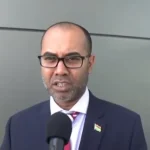Mauritius is a country blessed with many natural resources, warm smiles and what have we got? A land like no other! But most unfortunately, this land and its youth are being gradually invaded by one of the worst social evils — that of drug abuse.
The causes of drug addiction are many and include the increased availability of drugs, expansion of communication, socio-economic factors, migration and rapid urbanization, changes in attitude and values towards society, community, family, religion, morality and the ruthless exploitation of fellow human beings by drug traffickers
Social costs are heavy and are due to drug crimes and diseases, increasing poverty among addicts, overcrowded prisons, social and family disruption and human suffering, to name a few.
Since the high-risk group is primarily in the 15-35 years old category, the loss in manpower and productivity as a result, is enormous. Cannabis, heroin and opium, amongst other types of drugs, are very effectively ‘marketed’ to the country’s future generation.
The strategies adopted are such that those who are vulnerable are lured into this vortex that sucks them in—and invariably keeps them there—sadly, many of them take this line of least resistance whilst a handful are fortunate enough to get themselves out of this quagmire.
The government needs to desperately formulate and review its national policy on drugs. This would primarily involve treating drug addicts, rehabilitating them and the mooting of preventive education. So far the government needs to get involved with the day-to-day enforcement activities. Once they do that, this will combat the infiltration of drugs in certain ghettoes of our country.
It is an accepted fact that no country can solve this problem in isolation. So our government needs also to actively engage in formal international cooperation through bilateral, regional and international collaboration. We say this because our government is a member to the 1961 Single Convention on Narcotic Drugs and the Amending Protocol 1972.
More and more youngsters are taking soft and hard drugs. To a nation that firmly believes that its citizens have a right to a decent life with moral, humanitarian and spiritual values in a healthy and safe environment, this is a matter of grave concern.
It is vital that all agencies of the government and non-government organizations work in tandem with regard to enforcing the laws to reduce, if not totally eliminate the availability and distribution of illicit drugs.
Let us hope and pray that in the years to come, we shall see a drastic reduction in the number of drug addicts. Hope is one thing but reality is another matter. As long as we have self-interest politicians, an inefficient police force and certain money-minded so-called ‘do-gooders’ just to be in the limelight, we fear the worst to come.
Last but not least, in an effort to further raise awareness about helping thousands of families whose lives have been torn apart by drug abuse, both the government and the NGOs should work together and with other stakeholders if possible, towards innovative and effective policy solutions that address prevention, treatment and more, in order to help every community to overcome this devastating problem. There is a great deal that can be done to combat drug abuse through massive organization such as education, constant talks by experts at schools and colleges, organizing regional seminars, just to name a few.
AHMAD MACKY




![[Message de l’Eid-Ul-Fitr 2024] Atteindre la piété… Et après ???](https://sundaytimesmauritius.com/wp-content/uploads/2023/10/Bashir-new-218x150.jpg)


![[Democracy Watch Mauritius] The Rwanda genocide started 7th April 1994, 30 years ago. Has humankind learnt the lesson? Consider Israel’s action in GAZA today!](https://sundaytimesmauritius.com/wp-content/uploads/2024/03/democracy_0-218x150.jpg)







